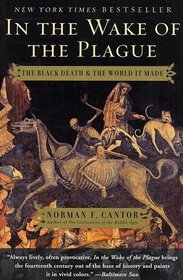Shirley J. reviewed In the Wake of the Plague: The Black Death and the World It Made on + 6 more book reviews
Helpful Score: 4
Great book!!
Cantor pulled together many different writer's work on the subject of the 'Black Death' that even someone with no knowledge understands the times before and after the plaque events in Europe. If you have knowledge of this time frame and subject material - I still think you would learn something that you didn't know. In the back of the book he includes about 10 pages of reference material which is divided into subject matter.
This book is a keeper for my library of reference books.
Cantor pulled together many different writer's work on the subject of the 'Black Death' that even someone with no knowledge understands the times before and after the plaque events in Europe. If you have knowledge of this time frame and subject material - I still think you would learn something that you didn't know. In the back of the book he includes about 10 pages of reference material which is divided into subject matter.
This book is a keeper for my library of reference books.
Helpful Score: 3
This is not a well-written, historically accurate, or interesting book about the plague. In fact, very little mention is made of the plague amid the author's ramblings. He goes on at length about the perception of the royalty then and throughout history until the 20th century. He has similar digressions on serfdom, property ownership, the persecution of Jews, and other seemingly random topics. The book is rife with historical inaccuracies and off-hand comments that reveal the author's biases. A much better book about the plague is John Kelly's The Great Mortality.
Elizabeth E. reviewed In the Wake of the Plague: The Black Death and the World It Made on + 41 more book reviews
Helpful Score: 3
Pretty fascinating account of how the plague spread and changed populations and economies the world over.
Helpful Score: 2
This book is a sociological examination of the Black Plague's effect on medieval Europe. I read it because I am interested in the Plague, but it is barely mentioned. I learned a couple of new things in this book, but I found it rather dry and tedious. There is a lot of name-dropping of Kings, Princes, gentry, and courtiers and not remembering these individuals from history classes, I found it similarly hard to follow. This is a good read if you're into medieval Europe, but not so much for the plague.
Helpful Score: 1
An interesting book about how the plague in medievel times changed the course of history forever.




